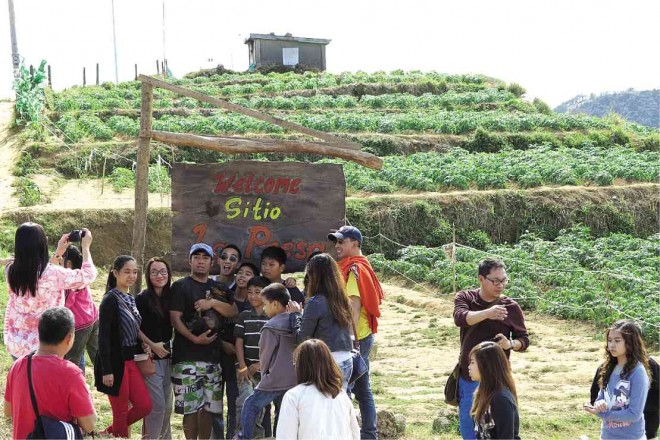DENR, villages to control traffic to Mount Sto. Tomas

TOURISTS crowd Sitio Pungayan in Mt. Sto. Tomas in Tuba, Benguet, the former location of the fictional farming community of La Presa in the teleserye “Forevermore.” EV ESPIRITU / Inquirer Northern Luzon
BAGUIO CITY—The government will control the volume of tourists visiting the fictitious La Presa community at Mount Sto. Tomas forest reservation in Tuba town, Benguet province, which has been placed under a permanent environmental protection of the courts.
The government will also ascertain the legal standing of people living or operating businesses inside the forest reservation after it completes a new Mt. Sto. Tomas survey, according to an action plan proposed by the Department of Environment and Natural Resources (DENR) and the Tuba government.
The plan was presented to the media in a June 4 news conference. It addressed the Writ of Kalikasan imposed on May 6 by the Court of Appeals over the reservation, following a petition filed by two bishops and residents of Baguio City and San Fabian town in Pangasinan.
The writ stopped all development work and regulated settlement inside the reservation.
Heeding the order, DENR said it would impose a moratorium on all activities in the area. It said it would regulate tourist visits to Sitio Pungayan there, where a television soap opera recently completed shooting its final scenes.
Article continues after this advertisementRalph Pablo, DENR Cordillera director, said the agency gave the Tuba government until June 15 to establish how many tourists could visit the area at a given time. Sitio Pungayan had been swamped with visitors since December last year.
Article continues after this advertisementPablo said the government would remove all souvenir shops and food stalls put up to serve guests, and put a stop to illegal pocket mining operations in the area.
He also said the government would consult farmers in the area about the establishment of a zone to protect the remaining forests from further intrusion by vegetable gardeners.
Once a survey is completed, “we will determine what rights they have to stay in the area,” Pablo told reporters here.
The action plan would also require a review of special permits issued to broadcast and telecommunications firms, which operate radar and satellite towers on Mt. Sto. Tomas.
The petitioners, led by Baguio Bishop Carlito Cenzon and Lingayen-Dagupan Archbishop Socrates Villegas, went to the Supreme Court to stop an illegal road excavation in the reservation’s Mt. Cabuyao that may have polluted a water source.
The Court of Appeals, which the high court had tasked to address the petition, held Baguio Rep. Nicasio Aliping Jr. responsible for the road excavation.
The appellate court said: “It is a conceded fact that [Aliping] caused earth-moving activities in his [land] claim [inside Mt. Cabuyao] without any environmental compliance certificate, tree-cutting permit, special land use permit, road right of way or excavation permit. In his letter dated May 21, 2014, Aliping said he undertook measures to avoid further damage to the plants, trees and dam of the [Baguio Water District], in effect an admission that there was indeed damage to the plants, trees and dam of the BWD caused by his earth-moving activities.”
The court said Aliping had “denied responsibility [for] the road construction emanating from his claim.” The lawmaker, the court said, had argued that the area used to have logging roads used by the Kairuz Lumber Corp. and the Heald Lumber Co.
But the court said evidence showed that the roads were newly opened. Vincent Cabreza, Inquirer Northern Luzon